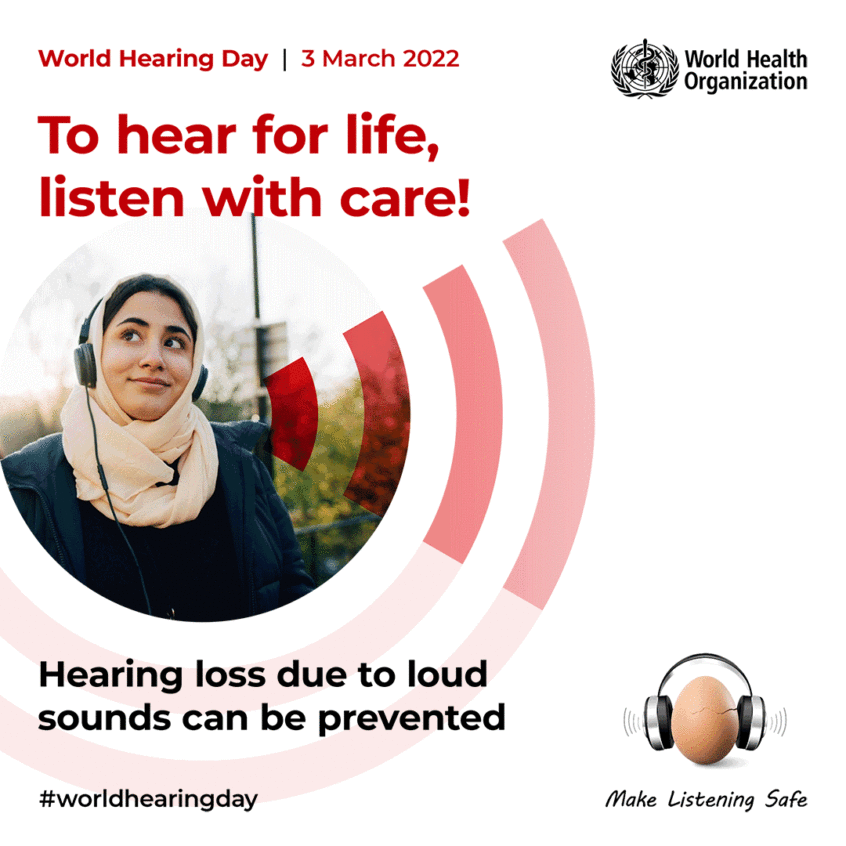March 3 is World Hearing Day, a day recognizing how widespread hearing loss is not just in the United States, but across the world. This year’s recognition focuses on preventing hearing loss in adolescents and young adults, highlighting the need for safe listening practices and use of hearing protection when appropriate.
According to the World Health Organization (WHO), one in two young people are at risk of hearing loss due to unsafe listening practices. The Hearing Loss Association of America (HLAA) further states that one in eight people in the United States (13%, or 30 million) aged 12 years or older has hearing loss in both ears, based on standard hearing examinations.
Loud sounds damage ears!
Listening to loud sounds damages sensory cells in your ears. This can lead to noise-induced hearing loss or ringing in the ear (tinnitus).
You could be at risk for noise-induced hearing loss if you regularly:
- Work in a noisy place.
- Listen to audio overhead/earphones.
- Visit places with amplified music e.g., nightclubs, concerts, or fitness classes.
Because noise-induced hearing loss can be permanent and cannot be reversed, the best thing anyone can do to prevent hearing loss is to protect their hearing.
Safe listening practices can prevent hearing loss. The louder you listen, the shorter the time for listening safely. By turning the volume down or protecting your ears, you can potentially listen longer without harming your hearing.
Adopt these simple safe listening behaviors recommended by the WHO to reduce the risk of hearing loss:
- Keep the volume down.
- Set your device’s volume level to no more than 60% of maximum.
- Use well-fitted, and noise cancelling headphones.
- Wear earplugs in noisy places.
- Move away from sources of sound, such as loudspeakers.
- Limit time spent engaged in noisy activities.
- In a noisy place, take regular breaks in a quiet area.
- Limit daily use of personal audio devices.
- Monitor listening levels
- Use apps to monitor your sound exposure.
- Choose devices with built-in safe listening features.
- Listen with care! Once you lose your hearing, it won’t come back. Individuals with hearing loss may benefit from hearing devices and rehabilitation.
The Hearing Loss Association of America offers this checklist to help you determine if you might have hearing loss:
- Do you sometimes feel embarrassed when you meet new people because you struggle to hear?
- Do you feel frustrated when talking to people because you have difficulty hearing them?
- Do you have difficulty hearing or understanding co-workers, clients, or customers?
- Do you feel restricted or limited when you have a problem hearing?
- Do you often think, “I can hear but I don’t understand what is being said?”
- Do you have trouble understanding the dialogue on internet videos, movies, or in the theater?
- Does a communication issue due to poor hearing cause you to argue with family members?
- Do you often ask people to repeat what they say?
- Do you think others mumble?
- Do you have difficulty hearing on the phone?
- Do you have trouble hearing the TV or radio and turn up the volume so that is too loud for others?
- Do you feel your personal or social life is limited?
- Do you have trouble hearing your dining companions when you are together in a restaurant?
If you answer “yes” to three or more of the questions above, the HLAA recommends you see a hearing professional.
Associated Audiologists, Inc., is Kansas City’s leader in audiologic care for hearing and balance disorders. Our team features professionals who use advanced diagnostic and verification technology to diagnose and treat hearing loss. The practice offers seven convenient locations and digital hearing products from the world’s most respected manufacturers backed by unparalleled service.
Schedule a comprehensive hearing evaluation with a doctoral-level audiologist to check your hearing and the latest hearing aid technology.



